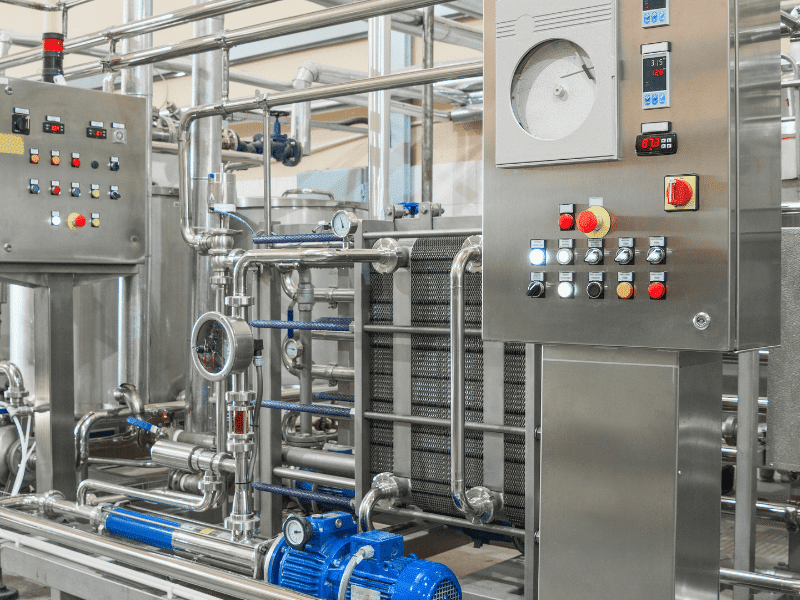With a wide range of radiator materials, it can be challenging to choose the right material. These materials include aluminum, mild steel, cast iron, and stainless steel.
The material you select impacts the cooling capacity of your radiator. In addition, it affects how well the radiator retains heat and the overall energy efficiency.
Aluminum radiators are one of the most notable types of radiators. Aluminum is a lightweight metal. Aluminum-built radiators rapidly conduct heat and give it off more easily than other materials.
In this blog, we will provide a comprehensive guide to Aluminum radiators. This guide will help you make the right choice for your business.
About Aluminum Radiator
An aluminum radiator is a component of the engine cooling system responsible for keeping a car engine cool. It is a radiator made of aluminum.
Aluminum radiators are important in various cooling systems. It is known for its lightweight, corrosion resistance, and excellent thermal resistance.
Aluminum radiators perfectly transfer heat from one medium to another. This makes it a popular choice in automotive and various industrial applications.
Primary Components of an Aluminum Radiator
An aluminum radiator is important to a car’s engine cooling system. They help maintain the vehicle’s engine temperature by heat dissipation.
The aluminum radiator is made up of various parts that work together. This ensures that the car’s engine runs smoothly during operation. These parts include:
- Radiator core
- Pressure cap
- Cooling fins
- Fan
- Inlet and outlet tank
- Thermostat
Aluminum Radiators vs Traditional Radiators
Aluminum is the third most abundant element on earth. Aluminum is known for its low density and corrosion resistance. This makes it the best fit for car radiators, planes, and other industrial applications.
The tide is currently turning because Aluminum is very cheap to produce. Many companies opt for aluminum radiators instead of radiators of other materials like steel, and cast iron.
Aluminum radiators differ from traditional radiators such as cast iron or steel. It heats up faster due to its superior thermal conductivity.
Aluminum radiators respond to heat changes faster than traditional radiators. This means that they are more energy efficient and keep the engine cooler.
7 Benefits of Using an Aluminum Radiator
Aluminum radiators provide various benefits, making them a good choice in various industrial applications. Here are some of the key benefits of using an aluminum radiator:
- Lightweight: Aluminum is a lightweight metal. This lightweight nature significantly reduces transportation costs and simplifies the installation. It is highly beneficial in the automotive industry since weight reduction can improve fuel efficiency.
- Excellent heat conductivity: Aluminum radiators have high thermal conductivity. They provide rapid heat transfer allowing for fast heat absorption and dissipation. Therefore aluminum radiators cool off the engine using a minimal amount of energy.
- Corrosion resistance: Aluminum metals create a protective oxide coating layer upon exposure to air. The oxide layer formed by the aluminum provides corrosion resistance and anti-corrosive properties. This layer helps to ensure the reliability and longevity of your radiator.
- Design variations: Aluminum radiators are available in different designs making them valuable for various applications. At Jiuju you can get the best aluminum radiators at an affordable price. In addition to that each radiator is designed to your specific needs.
- Density: Aluminum is the ideal candidate for applications where low weight and high strength are required. Aluminum is light and so easy to handle.
- Maintenance: Aluminum radiator requires low maintenance. This is due to aluminum’s corrosion resistance, which keeps it from rusting in the long run.
- Environmental sustainability: Aluminum provides good recycling potential. This is because there is no reduction in properties during the recycling process. Aluminum retains the same properties as the original aluminum. Aluminum is a 100% recyclable material.
5 Ways to Choose an Aluminum Radiator
Aluminum radiators have grown in popularity over time due to their superior performance. But not all aluminum radiators are right for your specific needs.
When choosing an aluminum radiator, some factors need to be considered. These factors ensure that it meets certain engine requirements and provides adequate cooling. They include:
- Core design: The core of a radiator is the part located between the tanks. It is responsible for the heat exchange. Search for aluminum radiators with high-quality core designs such as dual pass or multi-row configurations to improve heat dissipation.
- Quality of the material: Aluminum materials differ from each other. Top-quality aluminum radiators adopt the use of alloys. They are specially designed for improved corrosion resistance and heat dissipation.
- The fin design: The fin of the radiator is responsible for increasing the surface area of the radiator. An increased surface area helps in improving the cooling process. Look for radiators with proper designs that can provide efficient heat transfer and airflow.
- Compatibility of coolant: Check whether the radiator needed for your business is compatible with the type of coolant you want to use. Some aluminum radiators can only use specific types of coolant.
- Warranty: When choosing an aluminum radiator, a warranty brings several benefits. It indicates the manufacturer’s confidence in the quality and performance of its products. Jiuju offers a one-year warranty for every product. Additionally, we can replace the radiator for free.
4 Ways to Maintain Your Aluminum Radiator
The radiator is a key component that moves the coolant around a car’s engine. If your radiator is not maintained properly your vehicle can break down due to overheating.
It is crucial to maintain an aluminum radiator to avoid any mishaps regularly. Here are some tips to maintain and care for an aluminum radiator:
- Inspect the hoses and check for leaks: Check for cracks and leaks in your radiator hose. This should be done regularly, around the same time that the car oil is changed. Additionally, inspect clamps and ensure the gasket that is fitted to the radiator cap is in good condition.
- Avoid overloading your car: The heavier the load a car is expected to carry, the more the radiator needs to work to cool down the engine. Make sure that your vehicle is not put under extra stress.
- Coolant check: Inspections and maintenance of the radiator coolant level are vital. This prevents your car from overheating in hot weather and freezing in cold climates.
- Inspect the thermostat: Inspect the thermostat to make sure that it works properly. A faulty thermostat can cause the engine to overheat. If your thermostat fails, the recommended maintenance procedure is to replace it.
Conclusion
Aluminum radiators are the perfect choice for your brand. Aluminum radiators do not oxidize or corrode in damp conditions. This means they are extremely reliable and durable, and will not require frequent replacement.
The best aluminum radiator manufacturer and supplier is Jiuju. We provide high-quality aluminum radiators in various sizes and designs specific to your needs.
If you are in search of custom-designed radiators for your business, Jiuju has the right products for you. Reach out to us today and we will guide you to the best.





